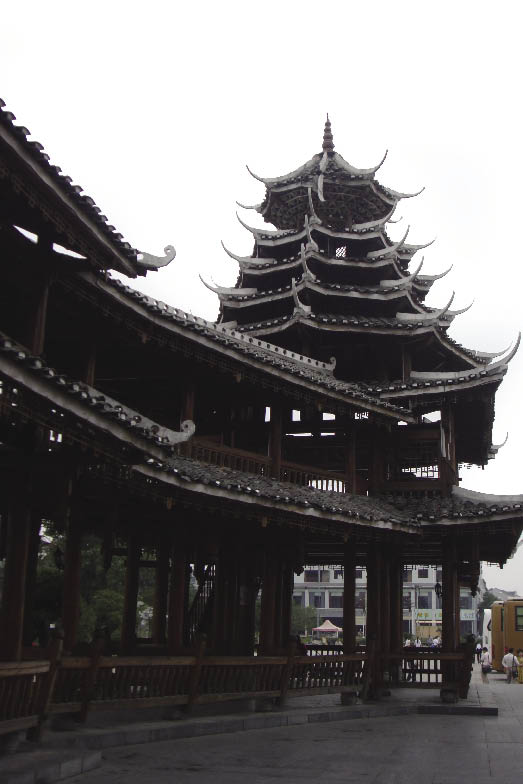| Back in Time: Visit to a Dong Village
By staff reporter ZHU HONG
For hundreds of years the Dong ethnic group has nestled on the Hunan-Guizhou-Guangxi borders in southern China. With a population of around 2.9 million, it is a relatively large minority but has shared territory in these mountainous regions with the Han, Miao, Zhuang, Yao, Shui and Tujia ethnic groups. Their settlements are difficult for visitors to access and the inconvenience means that amongst the Dong certain kinds of modern challenges are largely unknown. For the same reason, their indigenous culture has been relatively well preserved and remains largely free from threats. For the worldly traveler then, these villages have much to offer.
Song and Dance at the Door
Last September, on tour of some Dong settlements, I journeyed to Gaobu Village. Before entering the gate of this encampment in Tongdao Dong Autonomous County, Hunan Province, I heard voices raised in song and the resonant notes of lusheng, a local reed-pipe musical instrument. Before me lay a primitive village surrounded by mountains thick with forest cover, and – an engineering charmer – a lovely example of the Dong people’s distinctive wind-and-rain bridge spanning the waterway nearby.
The wind-and-rain bridge is a kind of roofed road-link serving as the only entrance to this village. We discovered it was “blocked” by a red silk ribbon. More than ten lovely Dong girls came forward to greet my tour mates and me, extending cups, proffering toasts and singing local songs. Our tour guide explained offering the “blocked-gate” wine was their grandest reception ceremony for guests. Dong people like straightforward friends, so if the guest drinks the wine heartily, they have made buddies of their Dong hosts. A finicky guest, reluctant to drink but still expecting passage, will have to sing a kind of duet with a local girl, a ditty in an antiphonal style responding to the girl’s lines in song. However, if the guest good-naturedly sings, and accepts the girl’s toast, but is still reluctant to drink… the Dong girl may feel slighted. The guest must at least take a sip of wine to pass the “barrier” in everyone’s good graces.
After drinking the “blocked-gate” toasts, we ambled across the wind-and-rain bridge to encounter our next surprise – a long-table banquet prepared just for us, with various delicious local dishes including pickled fish and meat, fragrant oiled tea and sweet rice wine. Part of our welcome was the so-called He Long Yan in Chinese, meaning get-together banquet.
The get-together banquet is only held at receptions for distinguished guests or on very important celebrations. The senior head of the village (usually an old man who enjoys the highest prestige there) gives the commencement address, then young men and women invite guests to sing and dance, Dong-style, hand-in-hand around the long table together. After tucking into the feast, the local Dong people and the invitees customarily toast each other. The Dong are known for their hospitality and organize themselves into small groups to make the rounds of singing toasts. If guests can’t respond in kind, they must drink. Custom also dictates that a guest must never make an attempt to quit the banquet before it has run its course; in any case, such attempts would be in vain because the Dong people jovially keep a guest at the table and engaged in the festivities. A good guest is not above getting “drunk” on the ways of the host, and the good host never wants to embarrass a guest, only to show the warmth of the welcome. Not all the guests will have the honor of attending a get-together banquet, so if you are fortunate enough to be invited, I advise you to seize on the opportunity and indulge yourself!
The price for accommodation in Dong villages normally ranges from RMB 10 to 100 for a standard room per night. Visitors to Dong villages should take special note whether a rope knot is hanging on the entrance gate of the village; if so, it indicates that the villagers are holding a grand ceremony honoring their ancestors. In line with the local custom, visitors should get locals’ approval before entering their village at this time.
Elegant Dong Architecture

We have mentioned the bridge, but Dong architecture is a topic we could explore for a long time. All the Dong villages are constructed on sites with specific natural features – south-facing mountain slopes with a stream winding around them. Every morning, the Dong villages resemble a wonderland rising slowly from the steam of the embracing waterway.
|

